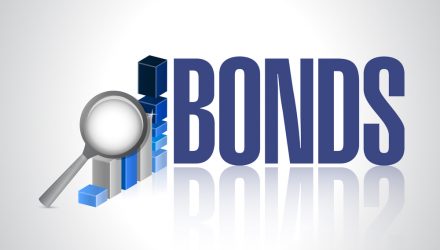The coronavirus pandemic fueled a credit line maxing bonanza by U.S. companies amid the uncertainty of revenues drying up and cash dwindling due to social distancing restrictions. Now, companies are issuing bonds to pay off these maxed lines, which, according to Bank of America analysts, could mean that corporations may not be as cash-strapped moving forward.
“Now we are seeing signs that some companies have confidence they can get to the other side because they are issuing corporate bonds to pay down credit lines,” Hans Mikkelsen, head of U.S. investment grade credit strategy at Bank of America, wrote in a note.“Of course, the main reasons are not just favorable developments around COVID-19 but also policy responses.”
With the Federal Reserve stepping in to purchase corporate bonds to help keep the economy afloat, one ETF to consider is the Goldman Sachs Access Investment Grade Corporate Bond ETF (GIGB). GIGB seeks to provide investment results that closely correspond to the performance of the FTSE Goldman Sachs Investment Grade Corporate Bond Index.
The fund seeks to achieve its investment objective by investing at least 80% of its assets (exclusive of collateral held from securities lending) in securities included in its underlying index. The index is a rules-based index that is designed to measure the performance of investment grade, corporate bonds denominated in U.S. dollars that meet certain liquidity and fundamental screening criteria.
Here are a few other ETFs to consider to get corporate bond exposure:
- ProShares Investment Grade—Intr Rt Hdgd (BATS: IGHG): IGHG tracks the performance of the Citi Corporate Investment Grade (Treasury Rate-Hedged) Index so it invests in long positions in USD-denominated investment-grade corporate bonds issued by both U.S. and foreign domiciled companies and short positions in U.S. Treasuries. Risk-averse investors would probably prefer a corporate bond ETF with a debt portfolio in investment-grade bonds, which is where IGHG invests 80% of its capital. Investment-grade allows investors to mitigate credit risk by allocating capital towards debt issues that are less likely to default versus less-than-investment-grade issues.
- Vanguard Short-Term Corporate Bond ETF (NASDAQ: VCSH): VCSH tracks the performance of a market-weighted corporate bond index with a short-term dollar-weighted average maturity–the Bloomberg Barclays U.S. 1-5 Year Corporate Bond Index. VCSH debt holdings mirror those found within the index, so U.S. dollar-denominated, investment-grade, fixed-rate, taxable securities issued by the industrial, utility, and financial companies comprise the debt portfolio. Furthermore, in order to curb volatility in the bond markets, maturities are relatively short-duration issues–between 1 and 5 years until maturity.
- SPDR Portfolio Short Term Corp Bd ETF (NYSEArca: SPSB): SPSB seeks to provide investment results that correlate with the Bloomberg Barclays U.S. 1-3 Year Corporate Bond Index. Once again, O’Leary would benefit from the reduced exposure to volatility with SPSB’s investment in shorter-duration debt with maturities less than three years. In addition, SBSP minimizes credit risk by constructing a debt portfolio that contains only investment-grade bonds with companies that are less likely to default.
For more market trends, visit ETF Trends.








